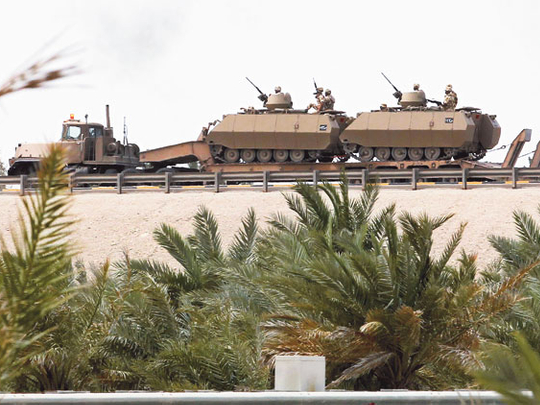
Manama: Bahrain declared a state of emergency for three months on Tuesday in an effort to quell rising political tensions and violence over the past four weeks.
Officials say a protester and a Bahrain police officer died and at least 170 were injured after violent clashes on Sitra Island and in the outlying villages of Salmbad, Nuwaidrat and Aali.
The city was largely deserted with shops, offices and cafes closed and makeshift barricades erected on streets. Youths armed with clubs and sticks stopped vehicles.
The deteriorating situation has resulted in security forces from the Gulf Cooperation Council (GCC) states being brought in to safeguard some areas.
Saudi Arabia said it had responded to a call for help from its neighbour under a mutual defence pact of the six-member GCC.
Declaring the state of emergency, Bahrain tele-vision announced: "The Commander in Chief of the Bahrain Defence Force has been mandated to take the measures and procedures necessary to preserve the safety of the nation and its people," adding that "other forces" could also be used if necessary.
In a statement on state television, Interior Minister Shaikh Rashid Bin Abdullah Al Khalifa urged Bahrainis and residents to "remain calm and to cooperate with security forces in preserving security and stability and protecting national achievements".
He said that the presence of the security forces was needed to achieve stability, address sectarian issues and reinforce national cohesion.
Meanwhile, the US has dispatched a top diplomat to Bahrain to try to facilitate talks between the government and opposition, a White House spokesman said.
No military solution
Assistant Secretary of State Jeffrey Feltman arrived in Bahrain on Monday, US officials said.
Feltman is urging all sides to act responsibly and allow a credible dialogue to take place, White House spokesman Tommy Vietor said.
Feltman ended another visit to Bahrain earlier this month.
"One thing is clear: there is no military solution to the problems in Bahrain. A political solution is necessary and all sides must now work to produce a dialogue that addresses the needs of all of Bahrain's citizens," Vietor said when asked for comment on Bahrain declaring the emergency.
"We urge all parties to act responsibly and allow the space needed for such a credible dialogue to take place. That is where we are focusing our energy. We have a senior State Department official — Assistant Secretary Feltman — working the issue aggressively on the ground as we speak," Vietor said.
Envoy to Iran recalled
Bahrain recalled its ambassador to Tehran after the Iranian government condemned the arrival of Saudi-led Gulf Arab forces in the kingdom and defended the demands of the mainly Shiite opposition protesters.
Iran, meanwhile, summoned the ambassadors of Saudi Arabia and Switzerland, which represents US interests in the Islamic republic, as well as Bahrain's charge d'affaires to complain.
"The Islamic Republic of Iran considers America responsible for the dangerous consequences of this illegal action," an unnamed Iranian diplomat told Swiss ambassador Livia Leu Agosti, state television reported.
Bahrain's state news agency said the kingdom had "decided to immediately recall its ambassador in Tehran for consultation".












